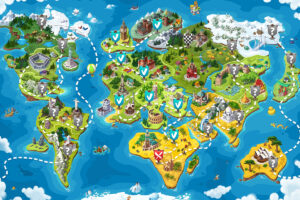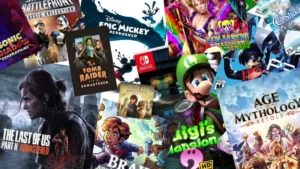Video game localization is about far more than just translating text. It’s about adapting the game so that it connects with players on a fundamental level across diverse cultural contexts. This intricate adaptive process, known as culturalization, ensures that games not only resonate globally, but also avoid cultural pitfalls that could alienate or offend players.
Let’s explore why culturalization is crucial, how it transforms the gaming experience, and what its impact looks like in real-world examples.

What is Culturalization in Gaming?
Culturalization involves tailoring a game’s content to align with the cultural norms, values, and expectations of its audience. It extends beyond language translation to include elements such as symbolism, humor, societal norms, and even gameplay mechanics.
One of the many benefits of consulting with a localization team early in the development process is that culture-related content issues can be identified and addressed upfront. This proactive approach ensures that gameplay mechanics, storylines, and even marketing strategies are culturally inclusive and immersive from the start.
Take, for example, a battle royale game set in a desert landscape. It might need to be adapted so that cultural elements of its settings reflect the traditions or sensitivities of the regions it represents. Similarly, character backstories, puns and jokes, and even imagery must feel authentic to enhance the immersive experience for players worldwide.
Why Culturalization Matters
Culturalization is the key to creating games that transcend language barriers and connect meaningfully with diverse audiences. When done well, it achieves several important goals.

- Culturalization deepens player engagement. Games that are culturally resonant draw players in by creating a personal connection that enhances immersion. Whether it’s a joke that lands perfectly or a storyline that feels authentic, these elements make the game unforgettable.
- It helps developers to avoid missteps. Poor representation or cultural insensitivity can lead to player backlash. Effective culturalization ensures respectful portrayals and overall cultural accuracy, preventing unintended offense.
- It broadens market reach. By tailoring games to different cultural contexts, developers open doors to new audiences and markets, thereby enhancing their global footprint.
Case Study: Culturalization in PUBG and Free Fire
PUBG and Free Fire are two popular battle royale games whose translators took on the challenge of localizing the games’ audio content for Arabic-speaking audiences. The goal was to maintain the excitement and urgency of the original game, while transforming the gameplay into a truly inclusive and culturally relevant experience. Here’s how the localization team met these challenges.
- Cultural Relevance: The localization team adapted military commands and strategic terms to reflect culturally appropriate phrases. This ensured that the localized audio felt authentic and engaging to Arabic players.
- Maintaining Emotional Impact: Intense moments, such as victory shouts and defeat laments, were creatively adapted to connect emotionally with the target audience. Understanding cultural nuances of expression helped convey the same intensity and emotion.
- Humor and Idioms: Humorous elements and idiomatic expressions were reinterpreted to fit the cultural context, guaranteeing that jokes and casual dialogues remained relatable and entertaining.
The Takeaway

In today’s global gaming landscape, culturalization is no longer optional. By understanding and respecting the importance of cultural contexts, developers create games that are inclusive, engaging, and successful.
Whether adapting battle cries, rethinking story elements, or refining visual design, the work of culturalization bridges gaps among diverse audiences and immersive narratives. As the gaming industry continues to expand, embracing culturalization will remain a cornerstone of meaningful, player-first game development.



